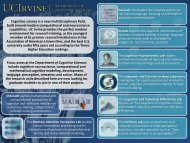Conscious Realism and the Mind-Body Problem - UCI Cognitive ...
Conscious Realism and the Mind-Body Problem - UCI Cognitive ...
Conscious Realism and the Mind-Body Problem - UCI Cognitive ...
You also want an ePaper? Increase the reach of your titles
YUMPU automatically turns print PDFs into web optimized ePapers that Google loves.
<strong>Conscious</strong> <strong>Realism</strong> <strong>and</strong> <strong>the</strong> <strong>Mind</strong>-<strong>Body</strong> <strong>Problem</strong> 111process (Bennett et al. 1989, 2002). There is simply no principled reasonwhy evolution requires physicalism. Evolutionary changes in genes <strong>and</strong>body morphology can be modeled by evolution whe<strong>the</strong>r those genes <strong>and</strong>bodies are viewed as mind-dependent or mind-independent. The ma<strong>the</strong>maticsdoes not care. Nor does <strong>the</strong> fossil evidence. A dinosaur bonedated to <strong>the</strong> Jurassic can be interpreted along physicalist lines as a mindindependentobject or, with equal ease, as a mind-dependent icon thatwe construct whenever we interact with a certain long-existing system ofconscious agents.For <strong>the</strong> conscious realist <strong>the</strong>re is, no doubt, interesting <strong>and</strong> fundamentalwork to be done here: We want a rigorous ma<strong>the</strong>matical <strong>the</strong>oryof <strong>the</strong> evolution of conscious agents which has <strong>the</strong> property that, whenthis evolution is projected onto <strong>the</strong> relevant MUIs, it gives us back <strong>the</strong>current physicalist model of evolution. That is, we must exhibit physicalistevolutionary models as special cases, in fact projections, of a richer<strong>and</strong> more comprehensive evolutionary <strong>the</strong>ory. But this is nothing specialabout evolution. We want <strong>the</strong> same for all branches of science. Forinstance we want, where possible, to exhibit current laws of physics asprojections of more general laws or dynamics of conscious agents. Somecurrent laws of physics, or of o<strong>the</strong>r sciences, might be superseded or discardedas <strong>the</strong> science of conscious realism advances, but those that surviveshould be exhibited as limiting cases or projections of <strong>the</strong> more completelaws governing conscious agents <strong>and</strong> <strong>the</strong>ir MUIs.Second, according to conscious realism it simply is not true that consciousnessis a latecomer in <strong>the</strong> history of <strong>the</strong> universe. <strong>Conscious</strong>nesshas always been fundamental, <strong>and</strong> matter derivative. The picture of anevolving unconscious universe of space-time, matter <strong>and</strong> fields that, overbillions of years, fitfully gives birth first to life, <strong>the</strong>n to consciousness, isfalse. The great psychological plausibility of this false picture derives fromour penchant to commit a reification fallacy, to assume that <strong>the</strong> icons wecreate are in fact objects independent of us <strong>and</strong> fundamental in <strong>the</strong> universe.We embrace this fallacy because our MUI successfully informs ourbehavior <strong>and</strong> has ostensible objectivity, because we construct <strong>the</strong> icons ofour MUI so quickly <strong>and</strong> efficiently that most of us never discover that wein fact construct <strong>the</strong>m, <strong>and</strong> because we first commit <strong>the</strong> fallacy in infancy<strong>and</strong> are rarely, if ever, encouraged to challenge it. The illusion of objectpermanence starts by nine months, <strong>and</strong> does not go easy.Third, st<strong>and</strong>ard evolutionary <strong>the</strong>ory itself undercuts <strong>the</strong> reificationfallacy that underlies HFD. Natural selection prunes perceptual systemsthat do not usefully guide behavior for survival, but natural selection doesnot prune perceptual systems because <strong>the</strong>y do not approximate objectivereality (see, e.g., Radnitzky <strong>and</strong> Bartley 1987). The perceptual systemsof roaches, we suspect, give little insight into <strong>the</strong> complexities of objectivereality. The same for lice, maggots, nematodes <strong>and</strong> an endless list of







